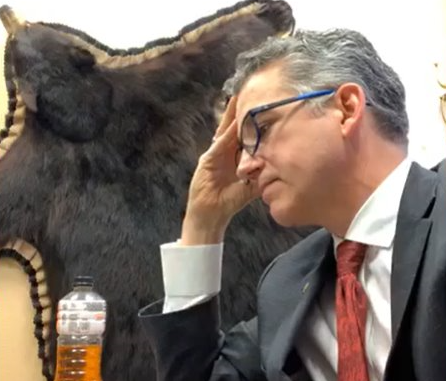
As you’re likely aware, the issue of refugee resettlement has been a hot topic for folks in Burleigh County. In fact, its been so for North Dakota and the nation in general.
We published a number of articles on the topic last month when the Burleigh County Commission was considering whether to give its stamp of approval to Lutheran Social Services continuing resettlement efforts in the area. That opportunity came as a result of an Executive Order, signed by President Trump, declaring that affected state and local governments are to be consulted going forward. After a lot of debate, commissioners voted 3-2 to give the go ahead.
Yesterday, headlines popped up again in North Dakota pertaining to the issue of refugees. Apparently the Burleigh County Commission will be considering putting the issue of resettlement to a vote of the people— a “nonbinding straw poll” of sorts.
In addition, one Mandan woman — Ellie Shockley — wrote a hit piece for the Bismarck Tribune criticizing Rep. Rick Becker (R – District 7) for his role in the debate on resettlement. She kicked off her argument by writing this:
“First, I can tell you that Rep. Becker betrayed his free-market patron saint, 19th century French legislator Frédéric Bastiat. One might expect that a prominent member of our Legislature’s own ‘Bastiat caucus’ would share Bastiat’s views. I guess it’s easy for politicians to claim affiliation with Bastiat’s legacy. It’s something else entirely to walk the walk.”
Shockley then goes on to explain Frédéric Bastiat’s support for Polish exiles seeking refuge in France in the 1830’s. You can read Ms. Shockley’s characterization in its entirety for yourself. But suffice it to say that it’s indeed problematic— for at least a couple reasons.
First, is the fact that Shockley’s entire letter is based on a false premise— that Rep. Becker is anti-refugee. This simply isn’t true. While Becker indeed “led the charge” by raising a number of very relevant questions — among them the issue of absorptive capacity — he never indicated he was anti-refugee. In fact, Becker acknowledges that many refugees are “good people” and “hard working”. You can see video of him discussing the subject here.
But for Shockley, Becker’s asking questions was nothing more than a “trick”, meant to give him “plausible deniability if accused of scapegoating refugees and manipulating voters/donors with fear.” It’s a ridiculous — and baseless — assertion.
Second, while it’s true that Bastiat supported Polish refugees coming to France, what Shockley didn’t tell you is that one of Bastiat’s biggest problems was government involvement with the process. We learn this from reading his own letter on the subject titled, “On a Petition in Support of Polish Refugees“. I encourage you to read it— in its entirety.
Bastiat writes:
“At this moment, a petition to the Chamber of Deputies is being signed in Bayonne to ask for the law dated 21 April 1832 relating to refugees not to be renewed when it expires.” (Emphasis Added)
As you can see in the “Editors Introduction” to Bastiat’s article, this 1832 law “guaranteed [refugees] some financial assistance but only in exchange for the onerous conditions which Bastiat describes later in the article.”
As you will see by reading Bastiat’s article, the French government restricted “foreign refugees to living in France in one or more towns of its choosing.” The 1832 law also stipulated that the government “may compel them to move to those towns as it chooses for them; it may order them to leave the Kingdom if they do not go to this destination, or if it considers their presence likely to disturb public order and peace.” (Emphasis Added)
To this Bastiat writes:
“It seems probable that the most ardent wish an exiled person can cling to, after the longing to see his exile come to an end, is to engage in some form of work and build up a few resources for himself through his industry. But, in order to do this, he has to be able to choose his place of residence. Those refugees who might be useful to commercial establishments have to reside in commercial towns; those who have an aptitude for a particular manufacturing industry have to be able to go to the regions in which such factories are located, while those of artistic bent have to live in the towns in which fine arts are encouraged. Finally, they have to have the right not to be expelled from one day to the next, and to expect that the sword of a despotic government will not be constantly held over their heads.” (Emphasis Added)
And then this important point:
“The law dated 21 April is calculated to prevent the Poles who are unable to receive either news or help from their own country, whose families are oppressed and dragged off to Siberia, or whose fellow-countrymen are dispersed and wandering all over the world, from doing anything for themselves to improve their lot. They are no longer refugees but genuine prisoners of war, huddled in their hundreds in villages that offer them no resources and where the uncertainty in which they find themselves prevents their taking steps that might decrease their expenditure.” (Emphasis Added)
In short, look at some of the points that Bastiat is making:
- A “despotic government” was choosing where these refugees were living and was compelling them to live there. (Sound familiar?)
- The result was their being “huddled in their hundreds” in villages with “no resources” and unable to “improve their lot”. (Does absorptive capacity ring a bell?)
- This ability to be free in determining where one lives and works allows a person the opportunity to fulfill “the most ardent wish [of] an exiled person”, which is to “engage in some form of work and build up a few resources for himself through his industry.” (Doesn’t really sound like welfare, does it?)
And again, what’s Bastiat’s solution to all of this? That’s right— to remove the government from the situation by allowing the 1832 law to expire.
But we didn’t quite get this context from Ellie Shockley, did we? No, instead, Ms. Shockley took a false premise — together with mischaracterizations — and ran with them. Should this surprise us though? Not really. At least when we consider the source it shouldn’t.
As you can see on the North Dakota Democratic-NPL website, Shockley is a Region 1 Chairman for the party. In other words, it looks like a Democratic hit piece on Rep. Rick Becker. Is it any wonder why they included a line in her bio that says, “This column represents her personal views and not the views of any organization.”?
To put it another way— we have a Democrat preaching to us about Free Markets and the Bastiat legacy. It’s really quite laughable.
While I expect things like this from someone like Ms. Shockley, I was disappointed to see that Rob Port at Say Anything Blog piled on. In an article that now appears on his employer’s website, Port uses Shockley’s atrocious letter as a catalyst for criticizing Rep. Becker and the Bastiat Caucus himself. His analysis is also horribly misguided. You can read the article here.
There’s a lot that could be said here, but when we consider the totality of Frédéric Bastiat and what he wrote, I’m not sure how any thinking person could ever come to the conclusion that he would support refugee resettlement as we know it today. Why? Because it’s government-run, is laced with welfare programs, and has nothing to do with Free Markets.
Ellie Shockley and others might disagree with Rick Becker. And that’s most certainly their prerogative. But at the very least, they should avoid false premise and mischaracterizations while doing so. Those only damage their credibility, not his.
PLEASE LIKE & SHARE!
Sources:
- https://theminutemanblog.com/tag/refugees/
- https://theminutemanblog.com/2019/12/01/burleigh-county-to-consider-okaying-refugees-at-monday-meeting/
- https://www.govinfo.gov/content/pkg/FR-2019-10-01/pdf/2019-21505.pdf
- https://bismarcktribune.com/news/local/bismarck/burleigh-county-oks-refugee-resettlement-after-passionate-testimony/article_ea486800-89eb-506e-bdd9-02ef38e6f5a6.html
- https://bismarcktribune.com/news/local/bismarck/burleigh-county-commission-to-discuss-ballot-question-regarding-future-refugee/article_a6f4bab8-3172-5634-94c2-5d8f0fc7109e.html
- https://bismarcktribune.com/opinion/columnists/speaking-out-bastiat-was-pro-refugee-so-why-isn-t/article_9a022250-6118-5d68-8b6c-7d2936123c51.html
- https://www.facebook.com/beckerfornd/videos/428822908067672/
- https://oll.libertyfund.org/pages/cw4#chapter-4-925
- https://demnpl.com/legislative-districts/
- https://www.inforum.com/opinion/4848804-Port-Hey-Bastiats-intransigence-is-not-an-ideology
- https://immigrationforum.org/article/fact-sheet-u-s-refugee-resettlement/





